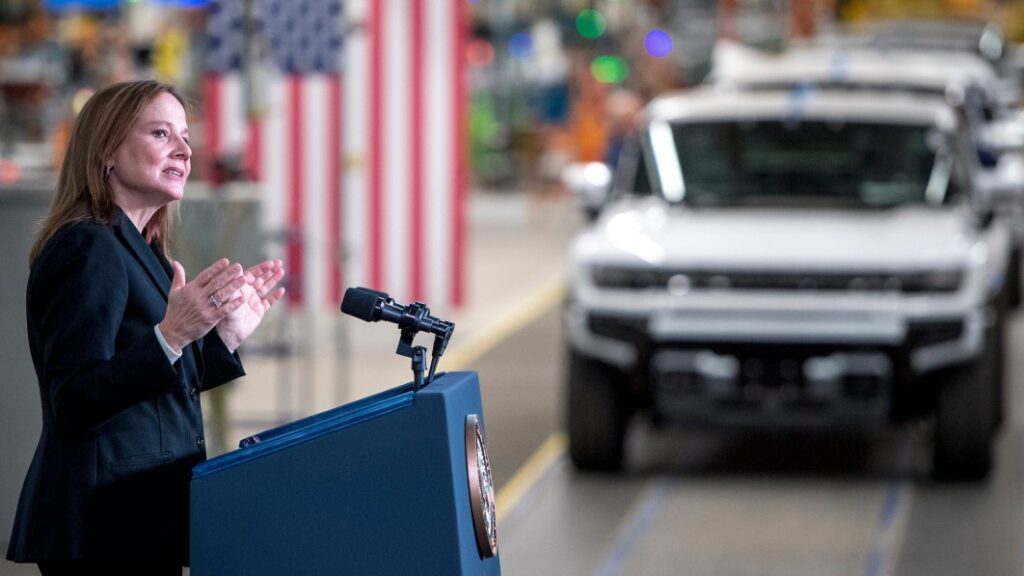Auto execs are coming clean: EVs aren't working

General Motors CEO
Mary Barra.
Nic Antaya / Stringer / Getty Images
At earnings this week, several auto execs pulled back on EV targets.
Dealers have been warning of slowing EV demand for months.
“This is a pretty brutal space,” Mercedes-Benz’s CFO said this week.
With signs of growing inventory and slowing sales, auto industry executives admitted this week that their ambitious electric vehicle plans are in jeopardy, at least in the near term.
Several C-Suite leaders at some of the biggest carmakers this week voiced fresh unease about the electric car market’s growth as concerns over the viability of these vehicles put their multi-billion-dollar electrification strategies at risk.
Among the surprising hand-wringing is GM’s Mary Barra, historically one of the automotive industry’s most bullish CEOs on the future of electric vehicles. GM has been an early-mover in the electric car market, selling the Chevrolet Bolt for seven years and making bold claims about a fully electric future for the company long before their competitors got on board.
But this week on GM’s third-quarter earnings call, Barra and GM struck a more sober tone. The company announced with its quarterly results that it’s abandoning its targets to build 100,000 EVs in the second half or this year and another 400,000 by the first six months of 2024. GM doesn’t know anymore when it will hit those targets.
“As we get further into the transformation to EV, it’s a bit bumpy,” she said.
While GM’s about-face was somewhat of a surprise to investors, the Detroit car company is not alone in this new view of the EV future. Even Tesla’s Elon Musk warned on a recent earnings call that economic concerns would lead to waning vehicle demand, even for the long-time EV market leader.
Meanwhile, Mercedes-Benz — which is having to discount its EVs by several thousand dollars just to get them in customers’ hands — isn’t mincing words about the state of the EV market.
“This is a pretty brutal space,” CFO Harald Wilhelm said on an analyst call. “I can hardly imagine the current status quo is fully sustainable for everybody.”
EVs are getting harder to sell
But Mercedes isn’t the only one; almost all current EV product is going for under sticker price these days, and on top of that, some EVs are seeing manufacturer’s incentives of nearly 10%.
That’s as inventory builds up at dealerships, much to the chagrin of dealers. While car buyers are in luck if they’re looking for a deal on a plug-in vehicle, executives are finding even significant markdowns and discounts aren’t enough. These cars are taking dealers longer to sell compared with their gas counterparts as the next wave of buyers focus on cost, infrastructure challenges, and lifestyle barriers to adopting.
Just a few months after dealers have started coming forward to warn of slowing EV demand, manufacturers appear to be catching up to that reality. Ford was the first to fold, after dealers started turning away Mach-E allocations. In July, the company extended its self-imposed deadline to hit annual electric vehicle production of 600,000 by a year, and abandoned a 2026 target to build 2 million EVs.
In scrapping plans with GM to co-develop sub-$30,000 EVs, Honda CEO Toshihiro Mibe said the shifting EV environment was difficult to gauge.
“After studying this for a year, we decided that this would be difficult as a business, so at the moment we are ending development of an affordable EV,” Mibe said in an interview with Bloomberg this week.
For some, this pullback is no surprise.
“People are finally seeing reality,” Toyota Motor Chairman Akio Toyoda said at the Japan Mobility Show, the Wall Street Journal reported. Toyoda has long been skeptical of his peers’ pure-electric blueprints.



